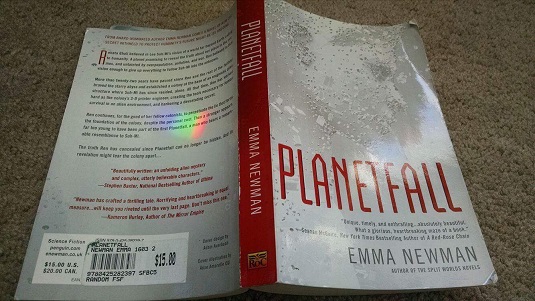
I was glad to be continuing the literary SF with Emma Newman's first book in the Planetfall universe. Originality is hard to come by in SF these days, but Newman manages something that, to my mind (and relatively limited reading range) is new. Planetfall's focus is Ren, a 3D printer engineer on a small colony world a few centuries from now. This settlement of about a thousand people huddles in the shadow of God's City, a huge, alien biotech structure that drew Ren and her fellow pioneers there in the first place. It's a tale of girl meets weird plant. Girl falls into coma. Girl awakes full of religious zealotry and leads an interstellar mission to another world to meet God. This prophet is Suh, Ren's flatmate, best friend, and unrequited love interest, and she resides in 'God's city', where every year the colonists make an offering with the lucky chosen one coming back with Suh's divinely-inspired wisdom. Or do they?
The originality of Planetfall lies not in the premise but in the character study. Ren is a deeply damaged woman. She shies away from the company of her fellow colonists, preferring to keep herself to herself and never letting anyone into her house. As the narrative progresses her mental health keeps getting worse, which fuels her paranoia and forces her to retreat even more. Luckily their new world is relatively hospitable and is made more so through advanced printing, biotech, and recycling. Homesteading away from Earth isn't that much of a privation. Despite Ren's precarious health, for 20 years everything has worked like clockwork. Until Mac, the colony's de facto leader spots an impossible stranger approaching the settlement. Impossible, because they're supposed to be the only people on the planet.
Paragraph stuffed with spoilers below.
There are so many things that make Planetfall great. The slow burn reveal of what really happened as the planet was first explored appeals to the mystery many SF fans savour, while Ren's character study stands up to anything you'd find in mainstream literary fiction. And then there's the narrative pattern in the book, the double movement of closing and opening. As the story opens up and revelations are teased, Ren's mental health crisis gets worse and she withdraws - closes - even more. Ren's house is off limits until it's forcibly opened by Sung-Soo, our mysterious stranger from the wastes, and the entire colony ends up traipsing through. The secret Mac and Ren have been harbouring and the resulting toxic bond between them is busted wide open, with seemingly disastrous consequences for the settlement and the cohering effects of its faith. The colony's recycling system is a closed loop economy until it's raided, the printers are smashed, and key specialists are carted away. To survive, those remaining are going to have to find ways of living with the planet on its terms. And God's City, which is secretly visited by Ren at night, is closed and has to be broken into. But the secrets it holds come out into the open when Ren removes her environmental suit and risks death by exposing herself. The city responds to this opening by guiding her to the place where the final revelation is revealed. In the process, the ransacking of her house occasions a break down, the revealing of hers and Mac's secret plunges her into a deep crisis, but when the decks are cleared she recovers and manages to find fulfillment by opening herself to and merging with God's City.
Just one point about the various write ups about Planetfall. While Ren's portrayal is often praised, Newman is criticised for populating her narrative with two-dimensional characters. As criticism goes, you have to ask whether anyone pushing this point was actually paying attention. Because of the nature of Ren's illness, she views everyone as an imposition and potential threat. The "two-dimensionality" is not an effect of Newman's inability to write sympathetic and rounded others, but is framing them through Ren's standpoint. It's her that is reducing them from rounded personalities to factors that might implode her world. And, as we see, her paranoia turns out not to be groundless.
This was Newman's first SF novel and it's better than most titles from genre authors who've been writing for years. Disgracefully, her publishers passed on her short story collection, Before, After, Alone set in the same universe (because, apparently, collections of shorts don't sell any more) and so she was forced to self-publish. If they're anything up to the standard offered here, they would be well worth checking out. The rest of the Planetfall sequence was well received, but so often, quality is not matched by the sales figures it merits. But interestingly her current project is a new SF novel set in a utopian society. Wedding this premise to a cultural context more receptive for thinking about political alternatives to what we've got might giver her work the wider acclaim - and audiences - it deserves.
Image Credit
Phil, I'm enjoying your forays into SF. I enjoyed Planetfall quite a lot, particularly the rendition of Ren's condition. I also like After Atlas, which similarly focuses on a damaged protagonist, albeit in quite different circumstances. I have yet to read Before Mars. Hadn't heard about the short story collection, so thanks for mentioning that.
ReplyDelete